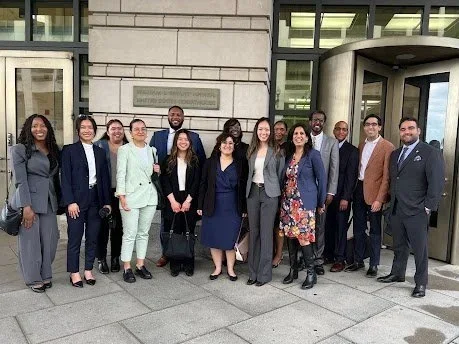Guide to Clerkships
Although judicial clerkships are a critical stepping stone to appellate work, the clerkship process can feel opaque and inaccessible for students who lack established networks or mentors to guide them. We’re here to change that.
Why Clerkships Matter
Clerkships are the main entry point for law students who want to pursue a career in any part of the appellate system—in courts, in law firms, in government offices, and in nonprofits. Some appellate employers may even consider appellate clerkships a prerequisite to joining their appellate practices.
Although over 30% of law students identify as people of color, law clerks of color remain consistently underrepresented in chambers. Too often, they are discouraged from pursuing clerkships. Many are told to not even bother applying, or self-select out after not seeing people that look like them in these spaces. And too many students simply do not even know about clerkships or their value.
Clerkship Handbook
The Clerkship Handbook is a resource designed to demystify the clerkship process and make these opportunities more accessible to all law students. By expanding access to this tool, we are building a stronger, more representative legal system for all of us.
This resource was created in partnership with our volunteer network, including many law clerks, attorneys, and judges. Thank you for helping us open doors for the next generation of judicial clerks.
What should you expect when clerking?
A judicial clerkship is a unique opportunity to participate in the litigation process from the vantage point of the court. It is also an opportunity to work closely with a judge as they reach decisions on various matters. A clerk is in many ways “the judge’s lawyer,” and is typically involved in analyzing legal issues and advising the judge on how to decide a particular matter.
What does clerking entail?
Working closely with judges, appellate clerks gain firsthand experience in complex legal analysis, opinion writing, and procedural nuance – skills that directly translate to effective advocacy in appellate practice.
Each clerkship is unique and will vary based on judge, court, and jurisdiction. A clerk’s day-to-day tasks often depend on the judge’s style and preferences in chambers and the courtroom, as well as the particular matters coming before that judge during a given term.
What are the benefits of clerking?
Clerking is a valuable experience for future appellate advocates. Clerks develop their legal research and writing skills, gain insight into judicial decision-making, and tackle a wide range of legal issues. Judges also benefit from a diverse chambers as they seek their clerks’ perspectives on the complex legal issues before them.
-
01
Gain exposure to a wide range of legal issues
-
02
Gain greater insight into judicial decision-making processes
-
03
Improve legal research and writing skills
-
04
Develop a lifelong mentorship relationship with their judge and meaningful connections with their co-clerks
in their words



























